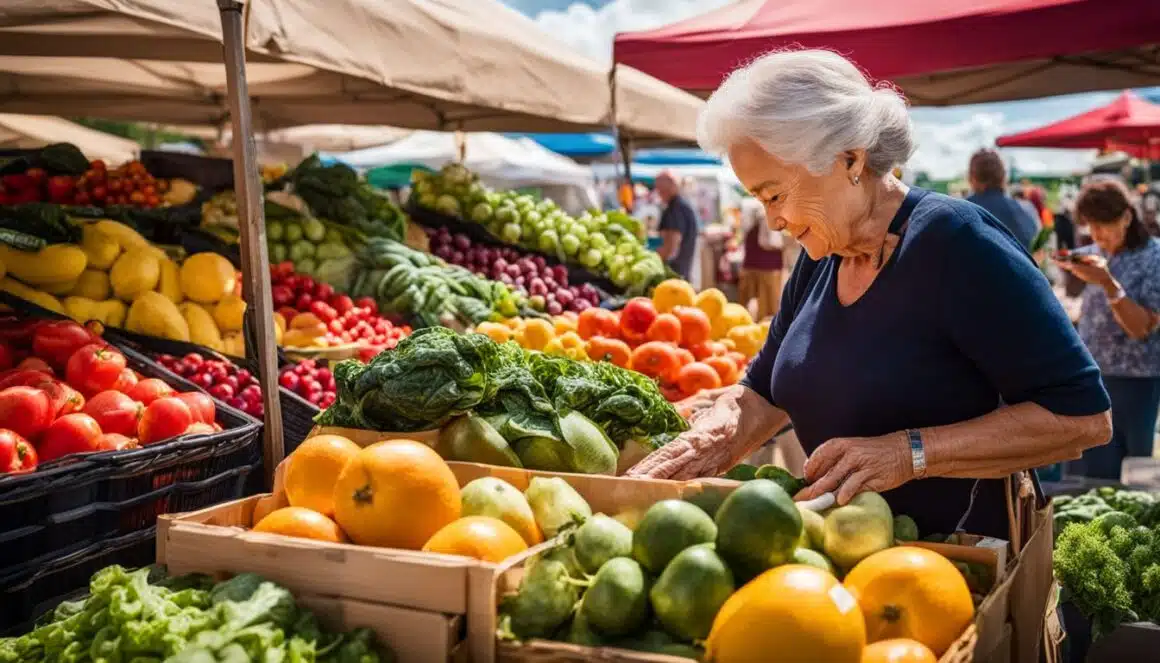As we age, maintaining a balanced diet becomes increasingly crucial for our overall health. Did you know eating the right nutrients can ward off chronic diseases and promote healthy aging? This blog post is your guide to Healthy Eating Tips for Over 50s making smarter food choices, highlighting foods that cater specifically to our changing nutritional needs.
Ready for Healthy Eating Tips for Over 50s? Keep reading!
Key Takeaways
- After turning 50, you must increase your intake of complex grains like brown rice and quinoa while reducing sodium levels in your diet. Prioritizing high-protein foods such as steak and fish can help keep your muscles strong.
- To improve your diet after 50, incorporate calcium-rich foods like milk and leafy greens to protect your bones. Balanced meals with lean proteins, complex grains, fiber-rich foods, and colorful produce can boost energy levels.
- Maintaining gut health is crucial; include complex grains like brown rice and oats in your diet. Avoid excessive salt consumption and add protein-filled foods like tofu or lentils. Regular exercise also helps maintain a healthy gut.
- Strategies for long-term adherence to dietary changes include swapping out salt for fresh herbs or spices, making smarter food choices by opting for whole foods, and reading food labels carefully. Integrating essential nutrients into smoothies can also support overall health when you’re over 50.
- After age 50, calorie needs decrease by about 200 calories per day1.
- Over 50% of older adults do not meet the recommended intake for calcium, vitamin D, or vitamin B12.
- Adults over 50 have an increased need for vitamin D and calcium to protect bone health. The recommended calcium intake is 1,200 mg per day.
- Protein needs increase to 0.66 grams per pound of body weight for adults over 50. This helps preserve muscle mass.
Key Changes in Diet After Turning 50

After turning 50, it is essential to focus on increasing complex grains intake, reducing sodium levels, and prioritizing high-protein foods to maintain a balanced diet. Follow these Healthy Eating Tips for Over 50s.
Increasing Complex Grains Intake
Eating more complex grains is important after you turn 50. Foods like brown rice, quinoa, amaranth and oats are good for this. These foods offer much-needed nutrients and fiber. They also keep your body strong by lowering the risk of sickness like heart disease or stroke.
So try to swap out white breads and pasta with these healthier options!
Reducing Sodium Levels
Eating less salt is good for your heart. Sodium in our food can make health problems worse, like heart disease and high blood pressure. At 50 years old, you should aim to eat no more than 1,500 mg of sodium each day.
This is less than what younger people need.
A lot of the sodium we eat comes from fast food or canned food. Try to pick foods that have less salt in them. Also, don’t add extra salt when cooking at home. Instead, use fresh herbs to give your dishes flavor! Another tip is to choose whole foods over processed ones if possible like yogurt and canned beans because they usually contain lesser amounts of sodium by portion size compared with other types of prepackaged meals.
Prioritizing High-Protein Foods
Eating foods with a lot of protein is good for you when you are over 50. Foods like steak, fish, and chicken breast give your body the protein it needs. You can also eat tofu, lentils and quinoa if you don’t want to eat meat.
High-protein foods help keep your muscles strong. They also help fix any damage in your muscles. This is very important for people who are 60 or older.
| Food Group | Recommended Servings Per Day | Examples |
|---|---|---|
| Vegetables | 3-5 | Broccoli, spinach, carrots |
| Fruits | 2-4 | Apples, berries, bananas |
| Grains | 6-11 | Oats, quinoa, brown rice |
| Protein | 5-7 oz | Fish, poultry, tofu, eggs |
| Dairy | 3 | Milk, yogurt, cheese |
Ways to Improve Diet for Over 50s

Protect your bones by incorporating calcium-rich foods into your diet, boost your energy levels with balanced meals, and maintain gut health by including fiber in your daily intake.
Protecting Bones through Calcium-Rich Foods
Strong bones need a lot of calcium. Foods rich in calcium help guard bones by keeping them tough. The risk for weak bones, also known as osteoporosis, is lower for those who eat calcium-packed foods. Women over 50 should eat 1,200 mg of calcium daily to keep their bones strong.
- Milk: A glass of cold milk has a lot of good stuff in it, like protein, vitamins, and loads of calcium.
- Cheese: Add cheese to your meals or snacks to boost calcium intake.
- Greek yogurt: It’s not only tasty but packed with bone-boosting calcium too.
- Fortified non-dairy milk: These drinks give you the same benefits as milk but without lactose
- Eggs: One egg has about 50 mg of bone-healthy calcium.
- Leafy greens: Greens like spinach and kale have many great nutrients, including calcium.
Boosting Energy Levels with Balanced Meals
Eating balanced meals can help boost your energy levels.
- Include lean proteins in your meals. Foods like chicken breast and turkey are good choices.
- Add complex grains to your diet. Brown rice, quinoa, oats, and amaranth can give you steady energy.
- Eat more fiber-rich foods. They help balance blood glucose levels, which helps you avoid energy crashes.
- Drink lots of water instead of sodas. Water keeps you hydrated and full of energy.
- Go for colorful produce at each meal. Berries, bell peppers, sweet potato, and broccoli add nutrients to keep you feeling energized.
- Avoid processed foods and excess sugars. They can drain your energy.
- Eating fish like salmon will supply omega-3 fatty acids that lower inflammation and boost your overall well-being.
Incorporating Fiber in Diet
Eating foods rich in fiber is a key healthy eating tips for over 50s. Fiber helps digestion and can lower cholesterol levels. It also keeps blood sugar steady, helping to prevent type 2 diabetes. Foods like oats, brown rice, and beans are packed with fiber.
Aim to eat whole fruits rather than drinking fruit juice for a fiber boost too! Fibrous foods also make you feel full longer, which can help maintain a healthy weight. Add these items to your meals to get the benefits of fiber!
Maintaining Gut Health
Keeping your gut healthy is one of the best things you can do for your body. Foods rich in complex grains, like brown rice and oats, are excellent for this. These foods help to keep our digestion system operating well.
It’s also good to add fish to meals as much as possible. Fish is full of omega-3 fatty acids that give a big boost to gut health.
It’s important not to eat too much salt, though. Too much salt can hurt the gut, making it harder for food to move through it properly. Even protein-filled foods like tofu, lentils, and quinoa bring benefits here too! And don’t forget about calcium-rich foods like milk or Greek yogurt; they’re key players in keeping our gut happy and sound.
Lastly, exercise goes hand-in-hand with diet when we talk about maintaining a healthy gut! Healthy eating habits paired with regular exercise make sure that all parts of our bodies are in top shape — including the gut! So go on, take care of your tummy today by eating right, moving more and following these Healthy Eating Tips for Over 50s
Strategies to Ensure Dietary Changes Stick

Swap out salt for healthier alternatives, make smarter food choices, and integrate nutrients into smoothies to ensure long-term adherence to dietary changes.
Swapping Salt for Healthier Alternatives
To maintain a balanced diet after turning 50, you can swap salt for healthier alternatives. Here are some options:
- Fresh herbs: Instead of using salt to season your meals, try adding flavor with fresh herbs like basil, parsley, or cilantro.
- Spices: Use spices like garlic powder, onion powder, paprika, or cumin to enhance the taste of your dishes without relying on salt.
- Vinegar and citrus juices can add a tangy flavor to your food and reduce the need for salt.
- Salt-free seasoning blends: Look for blends specifically made to replace salt in recipes. They often contain a mix of herbs and spices to make your meals flavorful.
- Low-sodium condiments: Opt for low-sodium soy sauce, Worcestershire sauce, or hot sauce instead of their high-sodium counterparts.
Making Smarter Food Choices
To maintain a balanced diet and healthy eating habits after turning 50, it is important to make smarter food choices. Here are some tips:
- Choose whole foods: Opt for fresh fruits and vegetables, lean proteins like chicken and tofu, and whole grains like quinoa and oats. These foods are nutrient-dense and provide essential vitamins and minerals.
- Limit processed foods: Processed foods tend to be high in added sugars, unhealthy fats, and sodium. Try to avoid sugary snacks, packaged meals, and fast food. Instead, opt for homemade meals using fresh ingredients.
- Read food labels: Pay attention to the nutrition facts on food packaging. Look for lower amounts of saturated fats, trans fats, cholesterol, sodium, and added sugars. Aim for higher amounts of fiber, vitamins, and minerals.
- Control portion sizes: Be aware of how much you’re eating by using smaller plates or bowls. This can help prevent overeating and promote portion control.
- Stay hydrated: Drink plenty of water throughout the day to stay hydrated. Avoid sugary sodas or sweetened beverages as they can add unnecessary calories.
- Plan your meals: Take time to plan your meals ahead of time to ensure you have nutritious options available. This can also help prevent impulsive food choices or reaching for unhealthy snacks.
Integrating Nutrients in Smoothies
Smoothies are a great way to incorporate essential nutrients into your diet. Here are some ideas to boost the nutritional value of your smoothies:
- Add fruits like berries, which are rich in antioxidants that help protect your body against inflammation and chronic diseases.
- Include a source of healthy fats, such as flaxseed or nut butter, to provide energy and support skin integrity.
- Consider adding leafy greens, like spinach or kale, for their high vitamin C and E content, which helps maintain skin elasticity and resilience.
- To support bone health, include calcium-rich ingredients like Greek yogurt or fortified non-dairy milk.
- If you’re concerned about vitamin B12 deficiency, consider adding a supplement or fortified plant-based milk to ensure you meet your daily requirements.
Conclusion

Maintaining a balanced diet is crucial for adults over 50 to support their health and well-being. By incorporating complex grains, reducing sodium intake, prioritizing high-protein foods, protecting bone health with calcium-rich foods, and making smarter food choices, individuals can improve their dietary habits.
These changes can help reduce the risk of chronic diseases like heart disease and diabetes while promoting energy levels and gut health. With these tips in mind, older adults can enjoy a healthy and fulfilling diet as they age gracefully.
FAQs
Q: What are some healthy eating tips for over 50s?
A: Some healthy eating tips for over 50s include maintaining a balanced diet, eating enough protein, making smart food choices, and including a variety of healthy foods in your meals.
Q: Why is healthy eating important for older adults?
A: Healthy eating is important for older adults because it supports healthy aging, helps maintain a healthy weight, reduces the risk of heart disease, supports healthy bones, and provides the necessary nutrients for overall well-being.
Q: How does a healthy diet contribute to healthy aging?
A: A healthy diet contributes to healthy aging by providing the necessary nutrients to support muscle mass, bone health, and overall well-being. It also helps reduce the risk of chronic diseases that are more prevalent as we get older.
Q: What should a healthy meal plan for over 50s include?
A: A healthy meal plan for over 50s should include a variety of foods from different food groups, such as fruits, vegetables, whole grains, lean proteins, and healthy fats. It should also be tailored to meet the nutritional needs of individuals based on their age, gender, and health status.
Q: Should I consult a dietitian for a personalized meal plan?
A: It is recommended to consult a registered dietitian for a personalized meal plan. They can provide expert advice on how to meet your specific nutritional needs and help you make the best food choices for your health.
Q: How does diet matters after age 50?
A: Diet matters after age 50 because our nutritional needs change as we get older. It is important to consume enough protein, calcium, and vitamin D to support muscle and bone health. Additionally, maintaining a heart-healthy diet can help reduce the risk of cardiovascular diseases.
Q: What are some good sources of vitamins for older adults?
A: Some good sources of vitamins for older adults include fruits, vegetables, whole grains, lean proteins, nuts, and seeds. It is important to include a variety of these foods in your diet to ensure you are getting all the necessary vitamins and minerals.
Q: How can older adults support healthy bones?
A: Older adults can support healthy bones by consuming enough calcium and vitamin D through foods like dairy products, leafy greens, and fortified foods. Regular weight-bearing exercise, such as walking or strength training, is also important for maintaining bone health.
Q: What is the Mind diet and how can it benefit older adults?
A: The Mind diet is a combination of the Mediterranean diet and the Dietary Approaches to Stop Hypertension (DASH) diet. It emphasizes consuming antioxidant-rich fruits and vegetables, whole grains, lean proteins, and healthy fats. This diet has been shown to support brain health and reduce the risk of age-related cognitive decline.
Q: Is it important to talk to your doctor about your diet after age 50?
A: Yes, it is important to talk to your doctor about your diet after age 50. They can provide guidance based on your overall health, medical conditions, and medication use. They can also help address any specific concerns you may have about your diet or nutritional needs.
Q: Why is it important to maintain a balanced diet as we age?
Maintaining a balanced diet is important as we age because it provides the necessary nutrients for good health, supports a strong immune system, and helps prevent chronic diseases.
Q: What should I include in a balanced diet for people over 50?
A balanced diet for people over 50 should include fruits, vegetables, whole grains, lean proteins such as fish or chicken, low-fat dairy products or alternatives, and healthy fats like olive oil or nuts.
Q: How can I avoid weight gain while maintaining a balanced diet?
To avoid weight gain while maintaining a balanced diet, it’s important to watch portion sizes, limit intake of unhealthy snacks and sugary drinks, and engage in regular physical activity.
Q: Are there any specific foods that can help improve brain health in older adults?
Yes, certain foods are known to support brain health in older adults. These include fatty fish high in omega-3 fatty acids (e.g., salmon), berries rich in antioxidants (e.g., blueberries), leafy green vegetables (e.g., spinach), and nuts/seeds with vitamin E (e.g., almonds).

